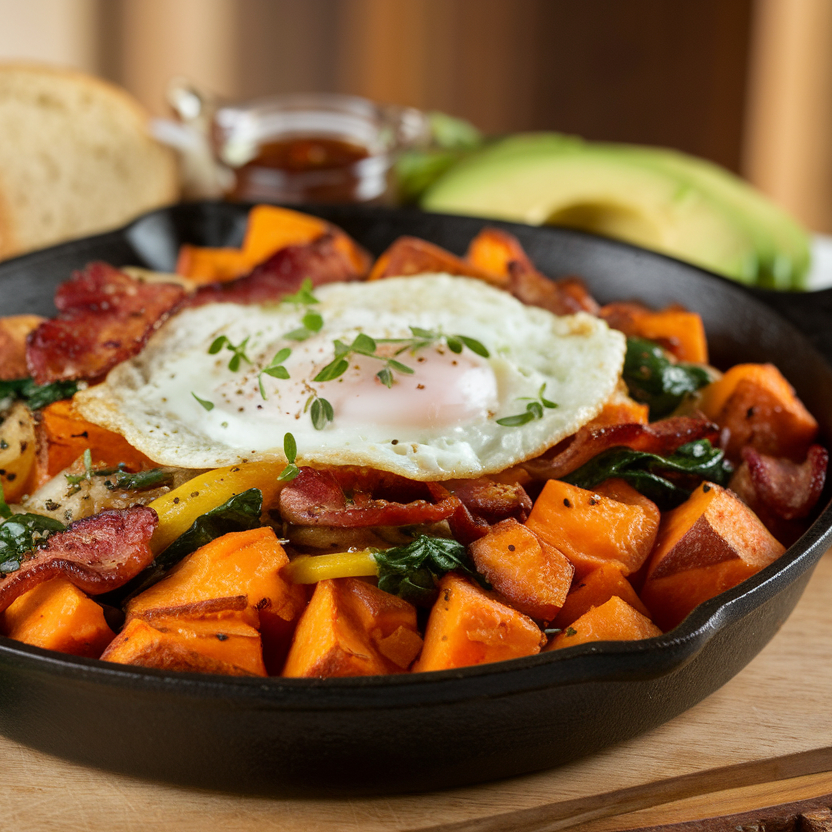Sweet potatoes are a versatile and delicious root vegetable that can be enjoyed at any time of day. While they’re often a popular choice for breakfast, such as in a sweet potato breakfast hash, many wonder if they can be incorporated into meals after breakfast as well. The short answer is: absolutely! Sweet potatoes are an excellent addition to lunch, dinner, or even as a snack due to their unique flavor, texture, and wide range of meal possibilities.
In this article, we’ll explore how sweet potatoes fit into your diet beyond breakfast, discuss the benefits of eating them after breakfast, and provide some easy and creative recipe ideas to help you enjoy them throughout the day.
The Nutritional Benefits of Sweet Potatoes
Sweet potatoes are packed with nutrients, making them an excellent choice for meals or snacks at any time. They are rich in vitamin A, vitamin C, and potassium, all of which provide essential health benefits. In addition to vitamins, sweet potatoes are also a great source of fiber and complex carbohydrates, offering slow-releasing energy that can help keep you feeling full and energized throughout the day.
Their antioxidant properties also make sweet potatoes an ideal food for supporting overall health. Including them in your diet after breakfast helps sustain your energy levels, balance your meals, and add a delicious variety to your day.
Learn more about the benefits of sweet potatoes in Sweet Potatoes: Nutrition and Health Benefits.
Sweet Potatoes as a Post-Breakfast Snack
So, can you eat sweet potatoes after breakfast? Absolutely! Whether you’re looking for a mid-morning snack or a light lunch, sweet potatoes offer a satisfying, nutrient-dense option that keeps you fueled. Their versatility makes them a great fit for any meal or snack.
Sweet potatoes provide sustained energy because of their complex carbohydrates, making them ideal for snacking between meals. Whether roasted, mashed, or turned into fries, sweet potatoes can help curb hunger while keeping you full without the heaviness of a full meal. They also pair well with other ingredients like avocado, cheese, or yogurt, making them adaptable to both sweet and savory cravings.
Check out this recipe for Easy Breakfast Sweet Potatoes that can easily be adapted for post-breakfast snacks or meals.
Comparing Sweet Potatoes to Other Carbohydrate Options
When considering post-breakfast meals, it’s common to compare sweet potatoes to other carbohydrate sources like rice, bread, or white potatoes. Here’s why sweet potatoes often come out on top as a preferred option:
- Nutrient Density: Sweet potatoes are loaded with essential vitamins and minerals that are often lacking in other starchy foods. They offer more nutrients per serving than many common carbohydrate sources.
- Lower Glycemic Index: Sweet potatoes have a lower glycemic index compared to white potatoes and processed carbohydrates, which means they provide a slower and steadier release of energy without causing a rapid spike in blood sugar levels.
- Natural Sweetness: Their mild sweetness makes them a perfect match for both savory and sweet flavors, allowing them to be incredibly versatile for post-breakfast meals.
Sweet potatoes are a smart choice if you’re looking for a nutritious, flavorful carbohydrate that pairs well with a variety of ingredients.
How to Incorporate Sweet Potatoes into Meals After Breakfast
There are countless ways to enjoy sweet potatoes beyond breakfast. Whether you’re in the mood for something light and fresh or more filling, sweet potatoes can easily fit into your post-breakfast meals. Here are a few easy and delicious ways to incorporate them into your lunch, snack, or dinner:
Roasted Sweet Potato Wedges
One of the simplest ways to prepare sweet potatoes is by roasting them. Toss them in olive oil, season with salt, pepper, and your favorite herbs (like rosemary or thyme), and roast in the oven until crispy on the outside and soft on the inside. These roasted sweet potato wedges can be enjoyed as a snack or paired with a salad or protein for a light meal.
Sweet Potato Tacos
For a fun and filling lunch option, try making sweet potato tacos. Roast or sauté cubes of sweet potatoes with black beans, corn, and spices like cumin and paprika. Pile the mixture into soft taco shells and top with avocado, sour cream, and salsa for a tasty and satisfying meal.
Sweet Potato Mash
Sweet potato mash can be served as a side dish for lunch or dinner. Simply boil sweet potatoes until tender, then mash them with butter or olive oil, and season with salt and pepper. For extra flavor, you can mix in a dash of cinnamon or nutmeg for a comforting and flavorful dish.
For more meal ideas, see Why You Should Be Eating Sweet Potatoes.
Recipe Ideas for Using Sweet Potatoes After Breakfast
If you’re looking for some creative ways to enjoy sweet potatoes after breakfast, here are three easy and delicious recipe ideas:
1. Sweet Potato Salad
This light, refreshing salad is perfect for lunch. Roast diced sweet potatoes and toss them with arugula, feta cheese, and walnuts. Drizzle with a simple lemon vinaigrette for a flavorful and nutritious meal.
2. Sweet Potato Tacos
As mentioned earlier, sweet potato tacos are a fantastic lunch or dinner option. You can enhance the flavor by adding toppings like pickled onions, cilantro, and lime for a zesty kick.
3. Sweet Potato Smoothie
For a unique and nutritious smoothie, blend cooked sweet potato with almond milk, banana, cinnamon, and a spoonful of nut butter. This smoothie is creamy, naturally sweet, and perfect for an afternoon snack or light meal.
Are Sweet Potatoes Too Filling for Post-Breakfast Meals?
Some may wonder whether sweet potatoes are too filling for post-breakfast meals. While they are indeed a filling food, you can easily portion them to suit your needs.
For snacks, opt for smaller servings like roasted sweet potato slices or a light sweet potato mash paired with fresh vegetables or a light dip. For lunch, pair sweet potatoes with lighter proteins or salads to create a balanced meal without feeling overly full.
The key is finding the right portion size and pairing sweet potatoes with complementary ingredients, such as lean proteins or healthy fats, for a satisfying yet light meal.
Common Myths About Eating Sweet Potatoes Throughout the Day
Myth 1: Sweet Potatoes Are Only for Breakfast
Many people mistakenly believe that sweet potatoes are primarily a breakfast food, but they can be enjoyed at any time of day. Sweet potatoes can be a part of snacks, lunches, and dinners, thanks to their versatility and compatibility with a variety of flavors.
Myth 2: Sweet Potatoes Are Too High in Carbs for Post-Breakfast Meals
While sweet potatoes do contain carbohydrates, they are primarily complex carbs that provide sustained energy. Unlike refined carbs found in processed foods, sweet potatoes offer slow-releasing energy that helps keep you full and energized between meals. They are a healthy addition to your diet when eaten in moderation.
How to Store and Reheat Sweet Potatoes for Later Meals
One of the great things about sweet potatoes is how easy they are to store and reheat. You can easily make a batch of roasted or mashed sweet potatoes in advance and enjoy them later in the day.
Storing Sweet Potatoes
To store cooked sweet potatoes, allow them to cool completely, then place them in an airtight container in the fridge. They will stay fresh for up to four days, making them perfect for meal prepping.
Reheating Sweet Potatoes
When reheating sweet potatoes, it’s important to retain their crispiness. For roasted sweet potatoes, use a skillet or oven to reheat them, which will help them crisp back up. Microwaving is an option, but it may result in a softer texture.
Sweet potatoes are also freezer-friendly. Store them in freezer-safe containers, and they will last for up to three months. To reheat, thaw them in the fridge overnight and warm them up in the oven or skillet.
FAQs: Sweet Potatoes After Breakfast
Can I Eat Sweet Potatoes at Any Time of Day?
Yes! Sweet potatoes are incredibly versatile and can be enjoyed at any time of day. Whether you’re eating them for breakfast, lunch, dinner, or as a snack, sweet potatoes offer a range of nutritional benefits and are a delicious addition to any meal.
How Do Sweet Potatoes Compare to Other Starchy Vegetables?
Compared to other starchy vegetables like white potatoes, sweet potatoes offer more fiber and vitamins such as vitamin A and vitamin C. They also have a lower glycemic index, which means they release energy more slowly and are less likely to cause a spike in blood sugar levels.
Are Sweet Potatoes Too High in Carbs to Be a Healthy Snack?
No, sweet potatoes are an excellent source of complex carbohydrates that provide long-lasting energy. Their combination of fiber and carbohydrates makes them a great option for a healthy snack that keeps you satisfied between meals.
What Are Some Creative Ways to Use Sweet Potatoes After Breakfast?
Sweet potatoes can be used in a variety of ways beyond breakfast. Try incorporating them into salads, tacos, or even smoothies. You can also enjoy roasted sweet potato wedges or sweet potato mash as part of your lunch or dinner.
Can You Eat Sweet Potatoes Raw or Only Cooked?
Sweet potatoes are typically eaten cooked, as cooking softens their texture and brings out their natural sweetness. However, they can also be eaten raw when grated or sliced thinly, often used in raw salads or slaws.
Conclusion: Why Sweet Potatoes Make an Excellent Post-Breakfast Option
Sweet potatoes are a nutrient-dense, versatile food that can be enjoyed at any time of day. Whether you’re looking for a light lunch, a mid-morning snack, or a side dish for dinner, sweet potatoes are an excellent option. Their natural sweetness, nutritional benefits, and ability to pair well with a wide range of flavors make them a favorite ingredient in meals beyond breakfast.
So go ahead, and enjoy your sweet potatoes after breakfast—they’re delicious and perfect for any meal of the day!

